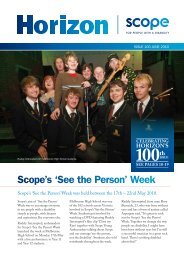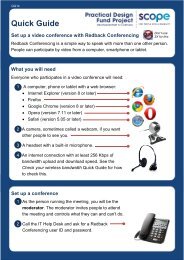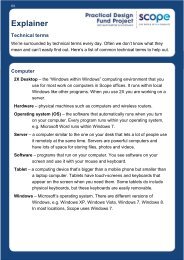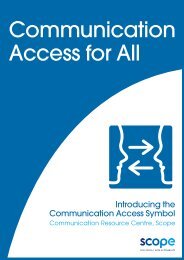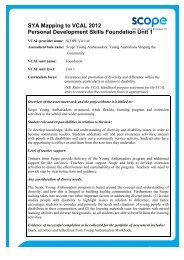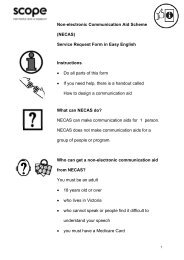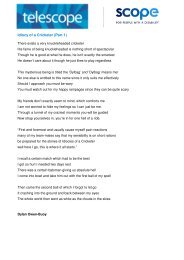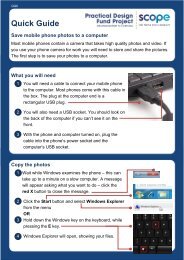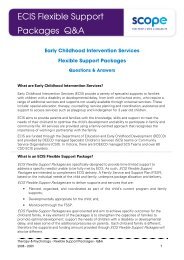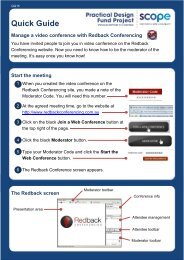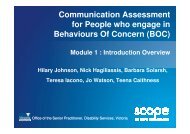Positive behaviour support Getting it right from the start
Positive behaviour support Getting it right from the start
Positive behaviour support Getting it right from the start
You also want an ePaper? Increase the reach of your titles
YUMPU automatically turns print PDFs into web optimized ePapers that Google loves.
<strong>Pos<strong>it</strong>ive</strong> <strong>behaviour</strong> <strong>support</strong>: <strong>Getting</strong> <strong>it</strong> <strong>right</strong> <strong>from</strong> <strong>the</strong> <strong>start</strong> - Facil<strong>it</strong>ators reference manual 57<br />
PowerPoint 79*<br />
Mistaken and alternative interpretations of <strong>behaviour</strong> 18<br />
Common misinterpretations<br />
Examples of Alternative interpretation<br />
Attention seeking<br />
For example: people follow staff or<br />
family members around <strong>the</strong> house,<br />
touch o<strong>the</strong>rs inappropriately, attempt to<br />
pass objects at seemingly inappropriate<br />
times; tease o<strong>the</strong>rs; interrupt o<strong>the</strong>rs<br />
or act in a way that is found to be<br />
‘annoying’.<br />
Self-stimulating<br />
For example: people rock, twist or play<br />
w<strong>it</strong>h <strong>the</strong>ir fingers and toes; slap <strong>the</strong>ir<br />
face or <strong>the</strong>ir legs persistently; twirl<br />
around; poke at <strong>the</strong>ir eyes; hum or sing<br />
inappropriately.<br />
Self-injuring<br />
People pick at <strong>the</strong>ir skin, cut <strong>the</strong>mselves<br />
w<strong>it</strong>h sharp objects, place objects in<br />
<strong>the</strong>ir body cav<strong>it</strong>ies, pull <strong>the</strong>ir hair out, eat<br />
or drink to excess.<br />
In<strong>it</strong>iating relationships –<strong>the</strong>y want friends<br />
Seeking company –<strong>the</strong>y are lonely<br />
Seeking reassurance – <strong>the</strong>y are scared<br />
Seeking help or <strong>support</strong> –<strong>the</strong>y lack skills or confidence<br />
Personal<strong>it</strong>y issues<br />
Bored, overwhelmed or over stimulated and may need to calm<br />
Unable to identify or in<strong>it</strong>iate an alternate activ<strong>it</strong>y<br />
Syndrome specific <strong>behaviour</strong>s, possibly related to neurological<br />
problems<br />
Health and medical needs<br />
Nervous<br />
Anxious<br />
Depressed<br />
Psychiatric issues<br />
Bored/Boredom<br />
Non-compliant<br />
People do not do things as <strong>the</strong>y are<br />
asked to do <strong>the</strong>m, when <strong>the</strong>y are asked,<br />
or do not finish things <strong>the</strong>y <strong>start</strong>.<br />
Not interested<br />
Not understanding<br />
Not being asked <strong>the</strong> <strong>right</strong> way<br />
Not having sufficient skills<br />
Not having sufficient stamina (tired)<br />
Recalling bad memories of a past experience<br />
Disruptive<br />
People talk or make noises at<br />
inappropriate times, yell, interfere w<strong>it</strong>h<br />
<strong>the</strong> work or activ<strong>it</strong>ies of o<strong>the</strong>rs or break<br />
things.<br />
Aggressive<br />
People throw objects or h<strong>it</strong> out at<br />
o<strong>the</strong>rs.<br />
F<strong>right</strong>ened<br />
Scared<br />
Stressed<br />
Lacking understanding of <strong>the</strong> s<strong>it</strong>uation<br />
Not knowing what is expected of <strong>the</strong>m<br />
Frustrated or even threatened<br />
The requirements of <strong>the</strong> current s<strong>it</strong>uation exceed <strong>the</strong>ir skill or<br />
level of tolerance<br />
O<strong>the</strong>r attempts to communicate are not responded to<br />
18. Taken directly <strong>from</strong>, Ke<strong>it</strong>h R. Mc Villy, <strong>Pos<strong>it</strong>ive</strong> Behaviour Support for people w<strong>it</strong>h an intellectual disabil<strong>it</strong>y:<br />
Evidence-based practice, promoting qual<strong>it</strong>y of life (2002) pp 56-57 published and distributed by The<br />
Australasian Society for <strong>the</strong> Study of Intellectual Disabil<strong>it</strong>y Inc, Victoria, Australia.



